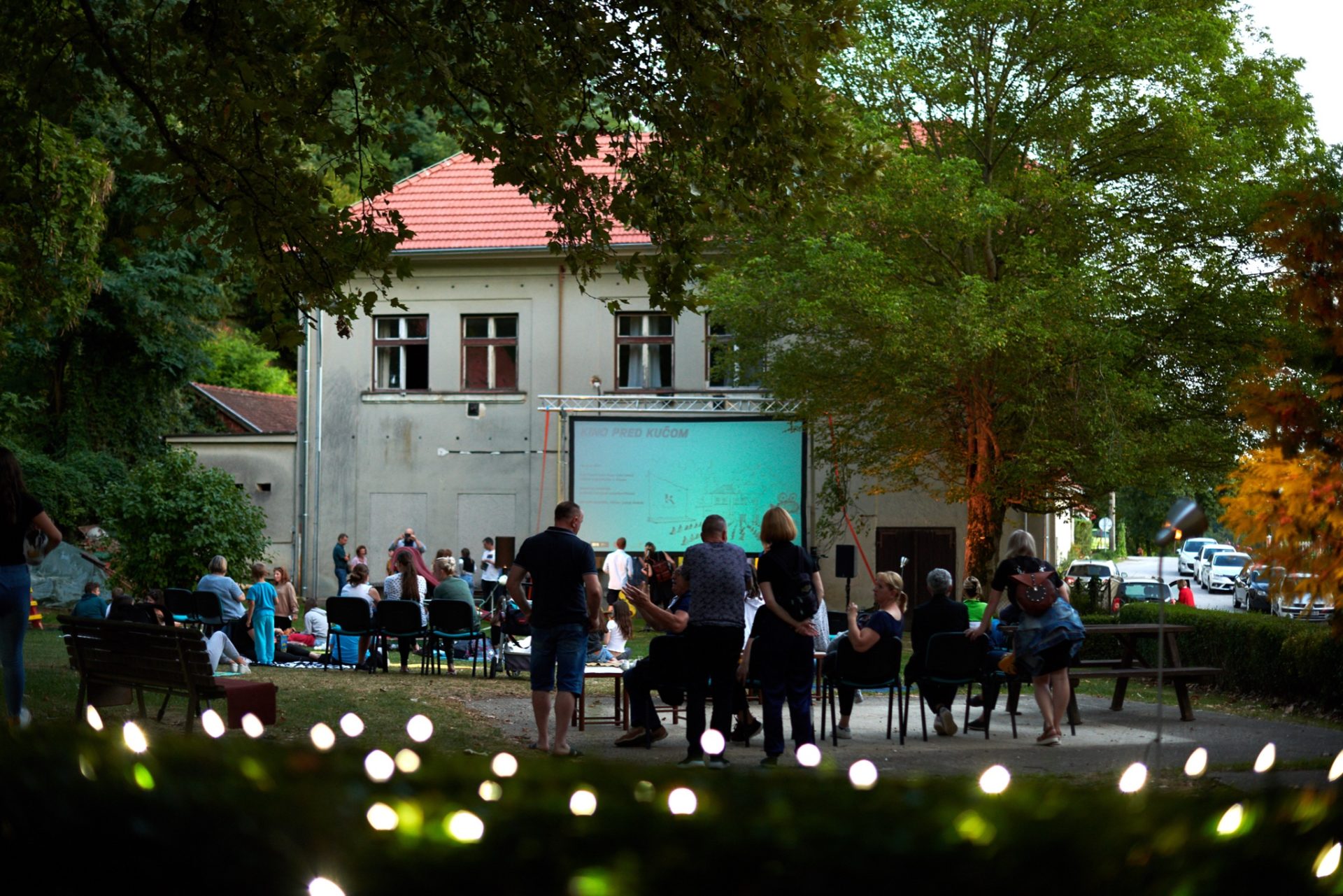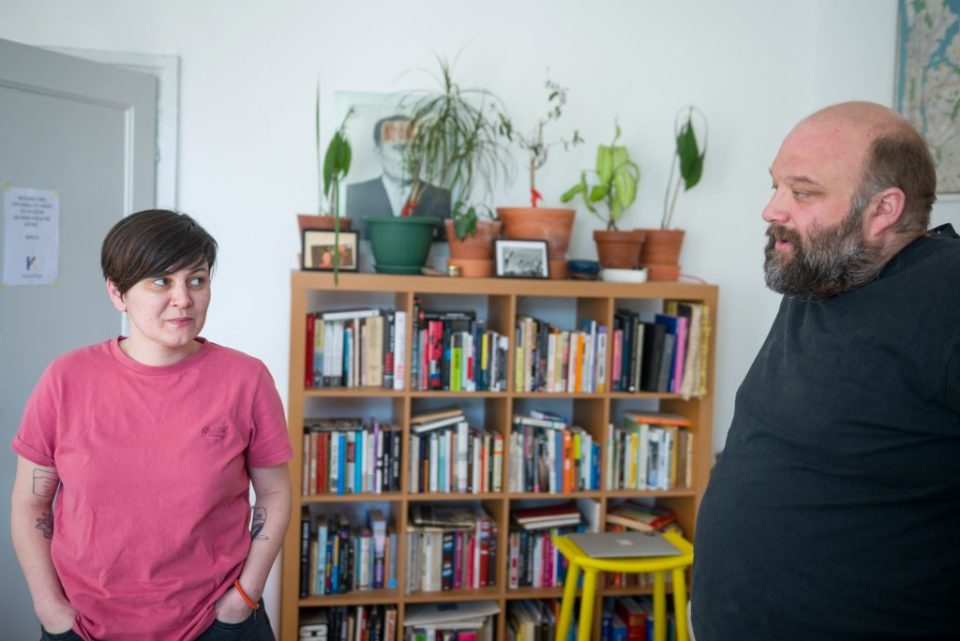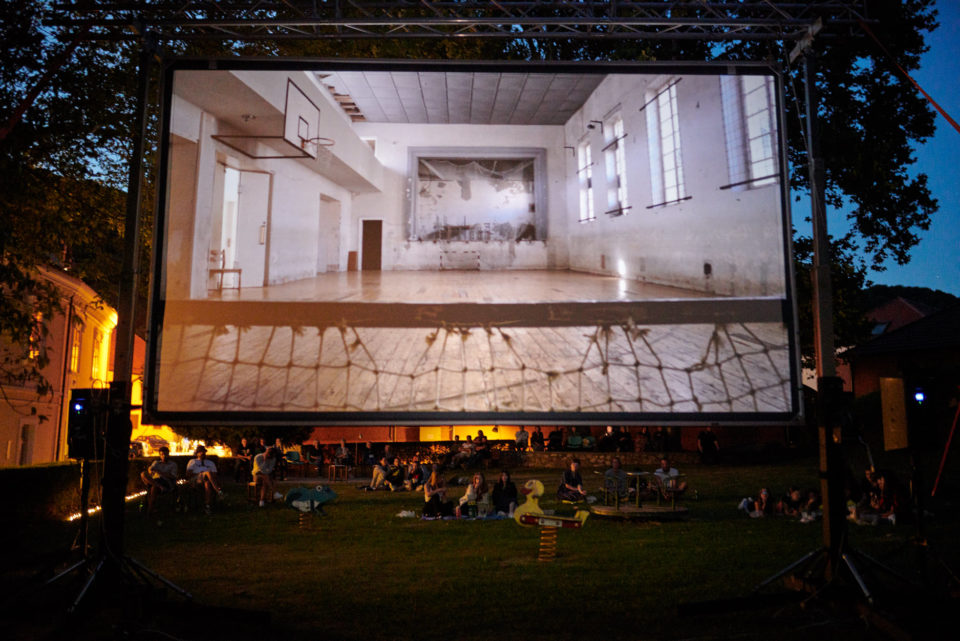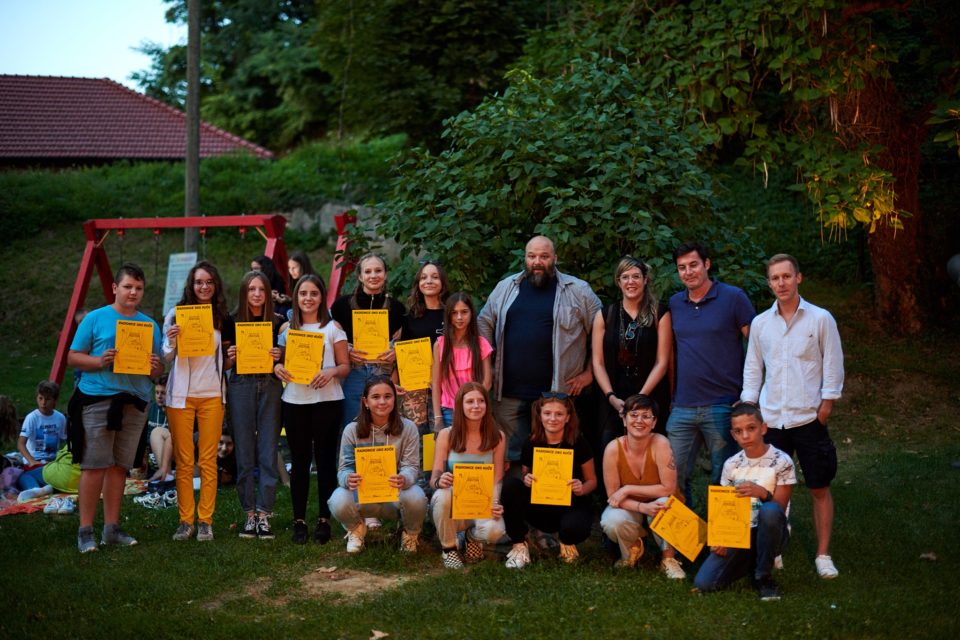
The economic, political, and cultural climate of the moment constantly questions the organization of independent spaces where contemporary art can be produced. This art aims to challenge, criticize, and forge connections with the community. It also provides insights on how to overcome patriarchal cultural norms which view art as merely an extension of its regressive politics.
Over decades of transition, numerous such spaces have emerged and disappeared, from Triglav to Vardar, due to their inability to sustain themselves. However, they have had a lasting impact on our small societies and cultures, shaping generations of artists, critics, and individuals who stand against conformity, the suspension of critical thinking, and turbo-folk culture.
One example of such a place is Kuća Klajn [Klajn House], which is growing and thriving in the Croatian town of Klanjec, among the hills of Zagorje, five kilometers away from Kumrovec. Led by Dunja Bovan, a cultural producer, and Jerko Marčić, an actor and educator, this place not only brings hope to small local communities, facilitating their functionality and interconnectedness, but also provides a residential space for artists. In this inspiring and authentic environment, artists can create, question, and experience, and then share their works with the local population and beyond.

For nearly half a decade, Dunja and Jerko have been working on the transformation of Kuća Klajn, with the help of campaigns, the enthusiasm of friends, and the support of the community who recognized the site’s significance. Prior to finding Kuća Klajn, or as they say, before it found them, they hadn’t considered establishing such a space, despite the fact that Zagreb and the rest of Croatia lacked fluid environments conducive to creative processes.
Dunja has extensive experience in producing film festivals, and a significant portion of her career has been intertwined with cinema. The fact that the house contained a cinema hall served as the initial “invitation” for them to embrace the location. It prompted them to contemplate the purpose of Kuća Klajn, whose rich history unmistakably indicated that its essence should remain closely tied to the community, creation, residence, and performance.
A Gathering Place
Kuća Klajn is a private house built in 1937 by Albert Novak, a member of the affluent Novak family in Klanjec. Albert Novak was, among other things, the first private carrier in Klanjec and the owner of a transportation line that connected Tuhelj, Desinić, Klanjec, and Zagreb. Part of the house served the personal use of the Novak family, while the larger section was designated for other purposes. It included a garage, accommodation for drivers, and additional lodgings. The house also contained the first library in Klanjec and hosted various social events, such as the Fašnik Ball and New Year’s Eve charity balls, which were attended by the local gentry.

The house was nationalized in 1943 and temporarily transformed into a boarding school for children from Kozara who were displaced by the Second World War. With post-war stabilization, the house continued resumed its role as a gathering place for the community. It operated as the Zelenjak Hotel and Restaurant for a period of time and then in the 1960s, the State University of Klanjec took over the management of the property. At their initiative, the house became a hub for a variety of cultural, artistic, and educational activities, including night schools and driving courses, a chess club, theater performances, and concerts. The Jedinstvo Cinema, located inside the house, became the town’s central venue, hosting different events ranging from book promotions to high school graduation ceremonies. It truly became the heart of social life in Klanjec.
The house also had its own printing press, accommodated private tenants, and housed the offices of the Self-Management Interest Community. Even today, on account of its rich history, Kuća Klajn is often referred to as the cinema or the old hotel, as it remains the primary gathering place for the community in the town and its surroundings. Dunja and Jerko purchased the house in 2019 and have since been working to restore its old purpose within a new social environment.
“For us, the only logical thing to do was to continue that lineage and pursue our own interests, with a slightly different aesthetic, particularly when it comes to contemporary culture and art. We like to think of this space as a community hub – both for the local community and the broader artistic community that longs for such spaces. While there are residency programs in Croatia, we aren’t aware of a space that combines residence, creation, and performance,” Dunja stated.
They believe that independent spaces for artists are always important, especially in times when it is difficult to rely on stable support, financial and otherwise, from institutions.
Their professional occupations have guided and assisted them in making their projects a reality. They explained that their greatest asset has been a kind of social capital, particularly when it comes to spreading awareness about the house and raising funds for its renovation through donations and crowdfunding. Some of their friends and colleagues, who are also members of the association Kućni Kolektiv [House Collective], collaborate with them in designing and implementing programs.
They add that they belong to the group of cultural workers who yearn for new possibilities, and perhaps even seek to escape institutional production. For them, the opportunity to create such a space represents the fulfillment of dreams that until recently had remained unexpressed.
Moving away from Traditional Theater and Dance
The workshops and residencies that take place at Kuća Klajn are multidisciplinary, connecting art with humanities and current social processes and contexts. This is something that is now only possible on the margins.
Speaking about the perception of the margin from the standpoint of Kuća Klajn, the owners of the house emphasize that being geographically situated on the border with Slovenia is a major advantage. While borders no longer exist, the significance remains clear.
“The influence of different cultures and historical transformations is a source of inspiration for us. It’s led to the creation of residency programs focusing on life on the border, or more precisely, life without borders. In terms of visibility and, once again, funding for culture, it is common for anything outside urban centers to be inherently marginalized. If we delve into deeper analysis, projects like ours are also considered ‘marginal’ within the context of cultural policies, although things are slowly but surely starting to change,” explained Dunja, expressing a sentiment shared by Jerko.
The biggest happening at Kuća Klajn this year is the completion of the renovation and transformation of the Martin Cinema on the ground floor of the house. The renovation was mainly financed through a crowdfunding campaign, and donations from numerous colleagues, companies, and local government bodies. The hall will serve as a versatile space for regular film screenings, theatrical and dance performances, artist and community gatherings, as well as seminars and rehearsals.

In addition to this, Kuća Klajn continues with its other programs, such as “Suvremeno u Zagorju” [Contemporary in Zagorje]. This program is returning for its third edition this year, bringing together domestic and foreign authors and performers from the field of contemporary circus, dance, and drama in Klanjec. Dunja and Jerko emphasized that their main goal is to introduce the audience to something they don’t often have the opportunity to experience.
“It’s a departure from traditional theatrical and dance productions, not to mention contemporary circus. The concept of the circus is still seen as something exotic and daring. In that sense, we are extremely pleased to collaborate with numerous organizations and associations that tirelessly work on popularizing these artistic practices, such as Škvadra, Cirkorama, defacto, Kunst Theatre, Room100 in Split, and many others,” explained the current owners of Kuća Klajn.
The design of Kuća Klajn, located in the heart of Klanjec, a small town in Zagorje that was home to the likes of Antun Mihanović, Oton Iveković, and Antun Augustinčić, was conceived in such a way as to promote feelings of safety and relaxation.
According to Dunja and Jerko, “Relaxation is a prerequisite for any creative work, for initiating any process, whether artistic or life-related. From a relaxed state, we can also perceive boundaries. Do we need them and to what extent should we build them? If we don’t need to build them, then we are not on the margins but at the center, symbolically speaking. And freedom becomes a matter of choice.”






